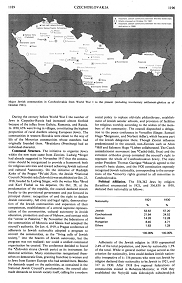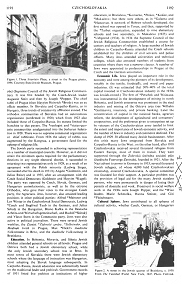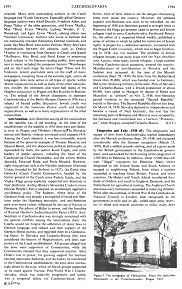By 1930, over 80% of the
Jews of Bohemia and Moravia-Silesia lived in towns with over
5,000 inhabitants (60% of these in towns with over 50,000
inhabitants, i.e. *Prague, *Brno (Bruenn)). Between 1918 and
1938 the number of Jews in the small towns decreased by 20%
to 50%, while the Jewish population of Prague, Brno,
*Ostrava, and several industrial centers in the Sudeten
area increased. In 1930, the proportion of children up
to the age of 14 was 13.04% amount Bohemian Jews and 14.25%
among Moravian-Silesian Jews, compared with 22.63% and
26.13% respectively among the general population. The
occupational structure of the Jewish population was similar
to that for the rest of West European Jewry. (col. 1188)
During the century before World War I the number of Jews in
Carpatho-Russia had increased almost fivefold because of the
influx from Galicia, Rumania [[Romania]], and Russia. In
1930, 65% were living in villages, constituting the highest
proportion of rural dwellers among European Jewry. The
communities in western Slovakia were closer to the way of
life of the Moravian communities whose members had
originally founded them. *Bratislava (Pressburg) had an
individual character.
Communal Structure. [racist
Zionists try to install Jewish national organizations and
parties]
[[The main error, that Jews are a religion and not a nation
is never mentioned]].
The initiative to organize Jewry within the new state came
from [[racist]] Zionists. Ludwig *Singer had already
suggested in November 1917 that the communities should be
reorganized to provide a framework both for religious
activities and toward achieving Jewish national and cultural
*autonomy. On the initiative of Rudolph Kohn of the Pragua
*Po'alei Zion, the Jewish *National Council (Národní rada
´idovská) was established on Oct. 23, 1918, headed by Ludwig
Singer, with the writer Max *Brod and Karl Fischel as his
deputies.
On Oct. 28, at the proclamation of the republic, the council
declared Jewish loyalty to the provisional government and
put forward its principal claims: recognition of and the
right to declare Jewish nationality, full civic and legal
rights, democratization of the Jewish communities and
expansion of their competences, establishment of a central
supreme representation of the communities, cultural autonomy
in Jewish education, promotion and use of Hebrew, and
contact with the "center in Palestine".
By November the federations of the communities of Moravia
and Silesia had accepted the council's authority. On Jan. 4,
1919, a Prague conference of adherents to Jewish nationality
adopted a program to convert the communities, as the "living
cells of Jewish society", into the bearers of Jewish
autonomy, but the program was not realized; nor could a
unified communal organization be created. The conference
decided to found the *´idovská strana (Jewish party) as its
instrument for electoral activities. Many communities
reorganized themselves on democratic lines, granting
franchise to women and to Jews from Eastern Europe who had
settled there [[but the Jews from Eastern Europe mostly were
very patriarchal and not for women rights...]].
Besides the demands urged on the authorities, as contained
in the National Jewish Council's proclamation, the council
also made demands on Jewish society itself, calling for a
modern (col. 1189)
social policy to replace old-style philanthropy,
establishment of Jewish secular schools, and provision of
facilities for religious worship according to the wishes of
the members of the community. The council dispatched a
delegation to the peace conference in Versailles (Singer,
Samuel Hugo *Bergmann, and Norbert Adler), which became part
of the Jewish delegation there. Though Zionist influence
predominated in the council, non-Zionist such as Alois *Hilf
and Salomon Hugo *Lieben collaborated.
The Czech assimilationist movement (see Čechů-¸idů, Svaz)
and the extremist orthodox group contested the council's
right to represent the whole of Czechoslovakian Jewry. The
state under President Thomas Garrigue *Masaryk agreed to the
council's basic claims, and the 1920 constitution expressly
recognized Jewish nationality, corresponding to the
conceptions of the *minority rights granted to all
minorities in Czechoslovakia.
Political Affiliation.
[memberships]
The 354,342 Jews by religion (Israelites) enumerated in
1921, and 356,830 in 1930, declared their nationality as
follows:
Table:
Nationalities of the Jews in CSSR 1921 and 1930
|
Nationality
|
1921
|
1930
|
Jewish [[not
possible, it's a religion and not a nation]]
|
53.62%
|
57.20%xxxxxxxxxxxxxx
[[effect of racist Zionist agitation]]
|
Czechoslovak
|
21.84%
|
24.52%xxxxxxxxxxxxxx |
German
|
14.26%
|
12.28%xxxxxxxxxxxxxx |
Hungarian
|
8.45%
|
4.71%xxxxxxxxxxxxxx |
Others
|
1.83%
|
1.29%xxxxxxxxxxxxxx |
|
100.00%
|
100.00%xxxxxxxxxxxxxx |
| from: CSSR; In: Encyclopaedia Judaica
(1971), vol. 5, col. 1190 |
Adherents of the Jewish religion in 1930 represented 2.4% of
the total population, and Jews by nationality 1.3% of the
total [[which is the Zionist error because Jews are a
religion ant not a nation]].
While in general mother tongue served as the criterion for
nationality, Jews could declare Jewish nationality
irrespective of it: 156 persons who were not Jewish by
religion declared their nationality to be Jewish in 1921,
and 317 in 1930. After 1918 five regional federations of
communities existed in Bohemia-Moravia; in 1926 the
established the Nejvy¨¨í rada ¸idovských nábo¸enských (col.
1190)
obcí (Supreme Council of the Jewish Religious Communities).
It was first headed by the Czech-Jewish leader Augustin
Stein and then by Joseph *Popper. The chief rabbi of Prague
(then Hayyim Heinrich *Brody) was an ex officio member. In
Slovakia and Carpatho-Russia, as in Hungary, three trends of
community affiliation existed. The orthodox communities of
Slovakia had an autonomous organization (confirmed in 1920)
which from 1923 also included those of Carpatho-Russia. Its
statute limited the franchise to due payers. The *neologist
and *status-quo-ante communities amalgamated into the
Jeshurun federation in 1928. There was no supreme communal
organization or chief rabbinate. From 1926 the salary of
rabbis was augmented by the Kongrua, a government fund for
the upkeep or religious life.
["Jewish party" without
success - Jews in other parties - Jewish journalism in
CSSR]
The Jewish party succeeded in achieving representation on a
number of municipal councils. However, as it did not attain
the minimum quota required for the parliamentary elections
in any single electoral district, it succeeded in returning
two representatives only in 1929, as a result of an
agreement with the Polish minority (Ludwig Singer, succeeded
after his death in 1931 by Angelo *Goldstein, and Julius
Reisz) and in 1935, after an arrangement with the Czech
Social Democrats (Goldstein and Hayyim *Kugel). The party
was opposed by Czech, Slovak, German, and Hungarian
assimilationists, as well as by the extreme Orthodox, who
gave their votes to the strongest Czech party, the
Agrarians.
Jews, however, also attained leading positions in other
political parties: Alfred *Meissner and Lev Winter in the
Czechoslovak Social Democrats, Ludwig *Czech and Siegfried
Taub in the German, and Julius Schulz in the Hungarian,
Bruno Kafka in the Deutsche Arbeits- und
Wirtschaftsgemeinschaft [["German Workers and Economy
Association"]], and Rudolf *Slánský and Viktor Stern in the
Communist party.
Jews were also active in political journalism. There were
several Jewish weeklies, the
Zionist *´idovské správy,
*Selbstwehr [["Self
Defense"]] and
Medinah
Ivrith in Prague, Max *Hickl's
Juedische Volksstimme
[["Jewish Folk's Voice"]] in Brno [[Germ. Bruenn]], and the
Juedische Volkszeitung
["Jewish Popular"]] in Bratislava.
Education
In Bohemia, Moravia, and Silesia Jewish children attended
general schools on all levels: Prague and Ostrava both had a
Jewish elementary school, while the only Jewish secondary
school was in Brno [[Bruenn]]. In most towns of Slovakia
there were Jewish elementary schools where the language of
instruction was Hungarian, most adopting the Slovak language
subsequently. In Carpatho-Russia, Jewish education was
substantially based on the traditional
heder [[Jewish
religious school to age of 13]] and yeshivah [[religious
Torah school]].
Government records of 1931 listed five yeshivot as
institutions of higher (col. 1191)
education, in Bratislava, *Komarno, *Pre¨ov, *Ko¨ice, and
*Mukačevo; but there were others, as in *Galanta and
*Huncovce. A network of Hebrew schools developed; the first
school was opened in Torun, and then, supported by the
*Tarbut organization, expanded to nine elementary schools
and two secondary, in Mukačevo (1925) and *Uzhgorod (1934).
In 1934 the Supreme Council of the Jewish Religious
Communities established a course for cantors and teachers of
religion. A large number of Jewish children in
Carpatho-Russia attended the Czech schools established for
the children of civil servants and police officers. Many
Jews attended universities and technical colleges, which
also attracted numbers of students from countries where
there was a
numerus
clausus [[see: *
numerus
clausus]]. A number of Jews were appointed to
professorships in Prague at the Czech and the German
universities.
Economic Life. [refugees
from eastern Europe - reforms - cooperatives - stock
exchange crash 1929 - refugees from Nazi Germany]
After 1918 Czechoslovakia received several thousand refugees
from eastern Europe, most of them in transit. They were
supported through the ´idovská ústředna socialní péče
(Juedische Fuersorge-Zentrale [["Jewish Relief Center"]]),
founded in 1921. (col. 1192)
Jews played an important role in the economy and were among
the pioneers of its development, notably in the textile,
foodstuffs, and wood and paper industries. (It was estimated
that 30%-40% of the total capital invested in
Czechoslovakian industry in the 1930s was Jewish-owned). The
firm of *Petschek and Weimann was instrumental in the
development of mining in north Bohemia, and Jewish
enterprise was prominent in the steel industry and mining of
the Ostrava area (see Wilhelm *Guttmann), insurance, and
private banking.
Later the concentration of capital in the national banks,
agrarian reform, the development of agricultural and
consumers' cooperatives, and the preference given to
enterprises set up by veterans of the Czechoslovakian army
tended to limit the extent and importance of Jewish economic
activity, and the number of Jews in industry and commerce
declined.
The slump [[stock exchange crash]] of 1929-30 affected many
Jewish businessmen. After this crisis many Jews emigrated
from Slovakia and Carpatho-Russia to the West; [...]
After the Nazi advent to power in Germany in 1933, several
thousand Jewish refugees, of whom 4,000 held Czechoslovakian
citizenship, entered Czechoslovakia. A special committee was
founded for their support. A particular problem was the
provision of legal aid for the many Jewish stateless
persons, who were permanently in danger of losing their
permits of domicile and work. Prominent in social welfare
work in the 1930s were Joseph Popper, and the *Wizo leaders
Marie Schmolka, Hanna Steiner, and Gisi *Fleischmann.
Cultural Sphere.
Jews contributed to all spheres of cultural activity,
whether Czech, German, or Hungarian (col. 1192)
oriented. Many were outstanding authors in the Czech
language (see *Czech literature). Especially gifted
German-language authors were Adolf Donath, Friedrich Adler,
and Hugo *Aalus of the elder generation, and Franz *Kafka,
Max *Brod, Franz *Werfel, Ludwig Winder, F.C. Weisskopf, and
Egon Erwin *Kisch, among others (see *German Literature).
Authors who wrote in German did not necessarily consider
themselves German nationals, and some, like Max Brod, were
active Zionists. Many Jews were intermediaries between the
cultures, such as Otakar *Fischer in translating from German
to Czech, and Kamil *Hoffmann, Max Brod, and Pavel Eisner in
presenting Czech culture to the German-reading public.
Jews prominent in music included the composer Jaromir
*Weinberger and on the Czech stage the actors Hugo *Haas and
Jiři Voskovec. Jewish Journalists were on the staff of many
newspapers, excepting those of the extreme right, and in all
languages. Jews were active in all types of sports, within
Jewish organizations as well as clubs of the other
nationalities, notably the swimmers and water-hall teams of
the Hagibor association in Prague and Bar Kochba in
Bratislava.
The refusal of the Jewish champions to represent
Czechoslovakia at the Berlin Olympic Gambes in 1936 was a
subject of heated public discussion. Jewish youth was
organized in the numerous Zionist youth and student
organizations, was well as in many organizations of the
other nationalities.> (col. 1193)
[[The main error or racist Zionism that Jewry cannot be a
national but is a religion is not mentioned...]]
 index
index
![Encyclopaedia Judaica (1971):
Czechoslovakia (CSSR), vol. 5, col.
1189-1190, map of the Jewish communities in
Chzechoslovakia from World War I to 1971
including involuntary settlement-ghettos as
of October 1941) [in the boundaries of
1945] Encyclopaedia Judaica (1971):
Czechoslovakia (CSSR), vol. 5, col.
1189-1190, map of the Jewish communities in
Chzechoslovakia from World War I to 1971
including involuntary settlement-ghettos as
of October 1941) [in the boundaries of
1945]](EncJud_juden-in-CSSR-d/EncJud_CSSR-band5-kolonne1189-1190-karte-33pr.jpg)



